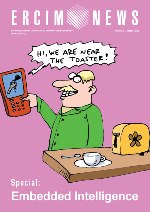by Veikko Ikonen
The project EASE (Ecological Approach to Smart Environments) aims to offer more profound analysis and research-based evidence to support the design of smart environments. Furthermore, the aim is to analyse the design issues related to the smart environments and offer some general guidelines for the design of smart environments in different application areas.
The technological shift of computing, including applications and services directed to two dimensions, embeddedness and mobility, has already changed a lot about our relationship to our environment (both social and technological).
Technology has always been embedded in our living environment in some way. The technological infrastructure has been fading from our sight as technology has reached a more mature status. In the electronic and computer era the wires, base stations and servers are usually hidden and we see only our personal technical appliances. However, the embeddedness of technology is now shifting from particular, computer-situated spaces, towards a computers-everywhere philosophy. The idea that we have a place where our interaction with our environment is supported by computers is changing. Soon we will have technological components (communicating with each other) everywhere, out of our sight, obtaining and utilising information gathered from the environment.
The increasing mobility of information and communication technologies has also changed our relationship with our environment. With mobile computers we can carry lots of data with us (eg books, music and photos), but at the same time we can also create new expressions of ourselves and share this information with others. This connection to the global network enables continuous information-sharing and communication in various ways. When these two dimensions work together, when the person with mobile technology interacts with the situated smart environment, we are approaching the area of ubiquitous (or pervasive) computing, also called ambient intelligence.

Even though research in the area of technologically-embedded intelligent environments is expanding very fast, the development of design approaches, other than technology-driven ones, is still in its early stage. The methodologies commonly used in designing and evaluating information and communication technologies have been quite goal-oriented, but new approaches and methods have been introduced and tested along the way. Design principles for intelligent environments have been published, but in these statements the technological issues are also emphasised to a greater extent. More profound co-operation between different designers, developers and researchers is needed in order to put forward new theories and methodologies that will help to develop solutions that naturally support people in their living environment and take into account both the complexity of the systems and technological aspects as well as social, ethical and cultural issues.
With EASE, we have brought together participants from different fields in designing computerised smart environments and especially those who deal with human technology interaction in this research area. The aim of the project is to identify, model and evaluate the ecology of an intelligent environment from the perspectives of human, technological, environmental and different design methodologies. We are specifying the attributes and characteristics of good smart environments as well as identifying and developing suitable methods for the design, implementation and introduction of technologically-enhanced smart environments. The participants make up an interdisciplinary team, which is vital in order to attain truly holistic knowledge of the phenomena. The project pools the knowledge that research partners have accumulated in other projects. Our aim is to cultivate this know-how and to develop and present it in a more general manner for designing future smart environments.
Ecology is defined by EASE as research of the dynamic interaction system between environment (eg technology in general) and people, in any relation to this technologically augmented environment. Users' actions with the smart applications shape the environment, and the smart environments produce effects on the users and the usage which may even be reflected outside the actual usage environment. The practise of this dynamic relationship is in continuous transition although it seeks stability.
Future computerised smart environments are a challenging design target. This issue is especially tricky when designing public places and multi-user environments. Private or semi-private spaces (ie, work, car, home) can be adjusted more easily according to individual users or a certain user group. It is also easier to compose common rules and regulations for workplaces than for public spaces, for example. One of the great challenges and opportunities would be to integrate the designer and the user again and give control over his computerised environment back to the user.
The technical development and consideration of technological issues of smart environments is going to be a huge job for our global society. Equally important is to consider cultural (including social and ethical) issues related to the technological progress of future computerised environments. User involvement and contextual studies of human technology-interaction in general are going to be a largely accepted curriculum of society in the near future. The great challenge is to maintain a holistic or ecological approach as a part of this curriculum, due to its multi-disciplinary nature.
We want to test our approach in multi-faceted environments where contexts are overlaid, interruptions in simultaneous tasks are more regulation than exception and where various user groups, with different skills and technologies, want to accomplish their primary and secondary goals. Usually, the only valid way to evaluate the concept is in the real-life longitude studies and follow-up studies.
The timeframe of the project is January 2005 to December 2006 and it is funded through the Finnish Funding Agency for Technology and Innovation (Tekes), VTT (Technical Research Centre of Finland) and TTL (Finnish Institute of Occupational Health). Other project partners are the University of Lapland, Tampere University of Technology, University of Tampere, University of Oulu, Helsinki University of Technology and University of Art and Design Helsinki. The project is coordinated by VTT. The steering group of the project consists of a wide range of enterprises and organizations.
Link:
http://www.vtt.fi/proj/ease/
Please contact:
Veikko Ikonen, VTT - Technical Research Center of Finland
Tel: +358 20 722 3351
E-mail: Veikko.Ikonen![]() vtt.fi
vtt.fi










